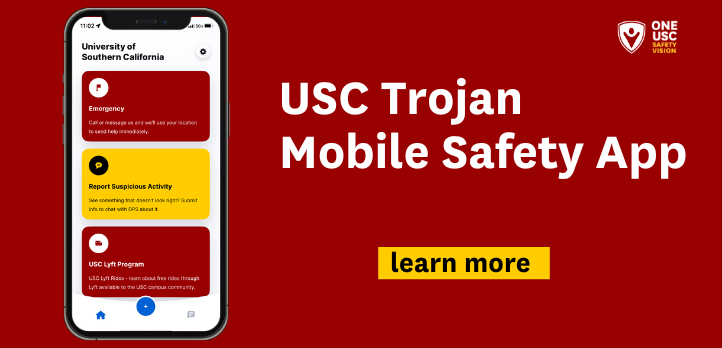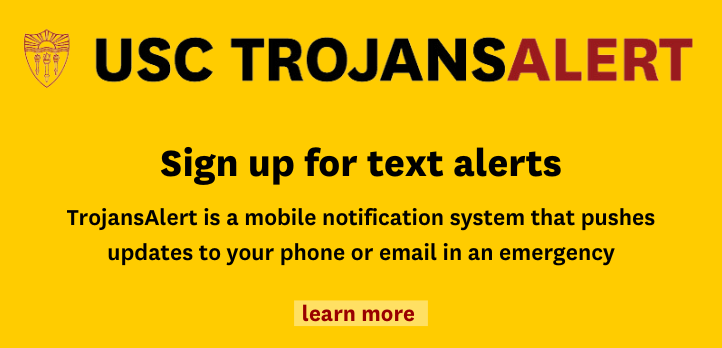The Department of Public Safety (DPS) has seen an increase in the number of thefts reported in the North University Park neighborhood, north of Jefferson Boulevard between Hoover Street and Figueroa Street. This increase involves package thefts and stolen bicycles and scooters.
There have also been recent reports of students being defrauded by scammers posing as landlords accepting rental deposits for properties they do not own. Please take a moment to review the below crime prevention tips:
Package Theft Prevention
- If you order items from Amazon, pick up your packages at the Amazon in USC Village.
- Be at home to accept packages when they arrive.
- If you are not home when your package is scheduled to arrive, arrange for a roommate or friend to accept the package for you.
- DPS recommends that if you are planning to conduct an online transaction with a stranger, ask the person to meet you at the DPS station.
Theft Prevention
- Avoid leaving your vehicle packed overnight with your luggage and other personal items.
- Make sure you close and lock your room and all exterior doors and windows when you leave.
- Use electronic timers for your interior lights, stereos or televisions while you are away. This gives the illusion that someone is at home.
- With today’s technology, there are some amazing apps that work with smart devices such as smart plugs, smart bulb, and mini cams available online for very low prices.
- Keep your bicycle or scooter in your room if possible, or securely locked.
- When leaving home for an extended time, have a trusted friend watch your house and have mail delivery suspended.
Scams
Scammers post fake ads online for rental properties and then collect a deposit online. Some scammers have been able to hack rental websites and collect deposits through alternative payments systems. Before renting any apartment or home, insist on being shown the interior of the property by the landlord.
Scammers are contacting students through various online social media and video chat platforms. They deceive students into believing they are entering into a consensual online sexual encounter and secretly record them. The students are then threatened with the video(s) becoming public unless the student sends the individual a substantial amount of money through Western Union, MoneyGram or other online payment services.
This is a criminal act known as extortion, and it is a serious crime. Scams – criminal acts accomplished through trick or deception – such as these can be avoided.
Never send strangers money or give them your banking or credit card information. Do not respond to friend requests from complete strangers.
If you have been the victim of a scam, the University of Southern California encourages you to report the crime to the Department of Public Safety (DPS) by calling (213) 740-6000 or to the Los Angeles Police Department by calling (877) 275-5273.
Learn the signs of other common scams
Never provide personal information or give money to anyone you do not know. Scammers may contact you by phone, email or the internet claiming to be from immigration or another government agency. A government agency will not ask you to transfer money through Western Union, or other companies, in order to rectify your immigration status.
Many scams happen when a stranger approaches you with a business offer or during an online transaction. If you do not know the person, DPS recommends that you ask the individual to meet you at the DPS station to complete the transaction.
Beware of tax scams. Do not fall victim to scammers who call and say they are with the IRS. There has been a large increase in phone scams that have people calling and threatening you with arrest or deportation if you do not pay.
Please be advised, even if you owe taxes:
- The IRS will never call and demand immediate payment over the phone.
- The IRS will never threaten or intimidate you, demand payment with a prepaid debit card or ask for your credit card or debit card number over the phone.
- The IRS will never threaten to call the police or immigration agents if you don’t pay.
If you or a fellow student receive a call like this, report it to the Treasury Inspector General for Tax Administration online or by calling 800-366-4484. Also, report it online to the Federal Trade Commission.
What to do if you believe you have been deceived?
If you believe that you are a victim of a scam, please notify DPS at (213) 740-6000 (University Park Campus) or (323) 442-1200 (Health Sciences Campus).
If you are in immediate DANGER, call the Los Angeles Police Department at 911 or the USC Department of Public Safety at (213) 740-4321.
Please note that race, ethnicity, gender and/or religious affiliation are NOT considered the basis for suspicion; only behaviors are considered suspicious.
If you have information relevant to the crime(s) reflected in this alert, immediately call DPS at (213) 740-6000 for the University Park Campus (UPC), (323) 442-1000 for the Health Sciences Campus (HSC) or (213) 485-6571 for the LAPD Southwest Division.
The purpose of this warning is to aid in the prevention of similar crimes by alerting the community about the incident and to provide information which allows individuals to make informed decisions about their personal safety.
USC Department of Public Safety Recommendations
- If you feel you may be in danger, immediately go to a safe location and report the crime to law enforcement. Call DPS emergency for UPC at (213) 740-4321, for HSC call (323) 442-1000, or call 911 for LAPD.
- If you observe a crime in progress, STAY CALM AND CALL DPS emergency for UPC at (213) 740-4321, for HSC call (323) 442-1000, or call 911 for LAPD. Do not attempt to apprehend any suspects or perpetrators of crime. Your personal safety and the safety of others around you should be your primary concern.
- Not every person you meet has good intentions. Be cautious of strangers and keep a safe distance. There is safety in numbers, so travel with friends.
- Avoid using cell phones or other technology while walking as criminals target distracted, inattentive individuals using them.
- Be a good witness : It is important to recall what you observed and provide as many details as possible to law enforcement such as: the sex, race, age, height, hair color, clothing, tattoos, scars of any suspects and a description of the make and model of any vehicle used in the crime and its license plate if possible.
- Do not attempt to apprehend any suspects or perpetrators of crime.
Other options to contact DPS, to report crime, ask for help and to receive information:
- Blue light emergency phones are located throughout UPC and HSC. The phones are connected to the USC DPS’ 24-hour communications center and identify the phone location if the caller is unable to speak. The phones can be used to request help, an escort, report suspicious activity and to report crimes. For more information visit: Emergency Blue Light Phones | Department of Public Safety | USC.
- Security Ambassadors : In addition to DPS officers who patrol a 2.5 mile radius around USC’s campuses, USC contracts with “Security Ambassadors” to patrol street corners in nearby neighborhoods and to observe and report crime and suspicious activity. This security force wears bright yellow jackets so you can easily spot them. If you need assistance, look for a Security Ambassador.
- Get a Ride : If you work, study or take classes at night, you don’t have to walk to your car or home alone. The USC Campus Cruiser will take you to your destination. If wait periods exceed 15 minutes, calls are automatically outsourced to Lyft, which you can take for free, ensuring you’ll never have to wait long for a safe ride home. For more information visit: USC Supplemental Safe Ride Program – USC Transportation.
- Verify your driver and car: Once you have requested a Lyft ride, you can view the driver’s rating. When your ride arrives, make sure the driver’s photo, license plate number and vehicle description match. Never take a ride you did not request or get into a car that doesn’t match the details provided by the Lyft app.
- Go the extra mile: The Lyft app’s “share your ETA” function allows you to invite friends to see your trip in real-time. The app will draft a text message you can share with friends that includes your ETA and a link to a live map that allows them to track your trip. Too much effort? Call a friend and stay on the line while you’re in the car instead.
- LiveSafe APP : To quickly make emergency push button calls to DPS or 911 on your mobile phone, download the Trojan Mobile Safety APP “LIVESAFE” from Google Play or the Apple iTunes Store. For more information regarding LIVESAFE visit https://dps.usc.edu/services/safety-app/.
- TrojansAlert: Register for USC’s emergency notification system TrojansAlert t o allow university officials to contact you during an emergency by sending messages via text message and email. For more information visit: http://dps.usc.edu/services/trojans-alerts/. (Please note that students, staff and faculty automatically are signed up for TrojansAlerts.)
If you have any questions regarding this Crime Alert, please contact the on-duty Watch Commander in DPS at (213) 740-6000.

